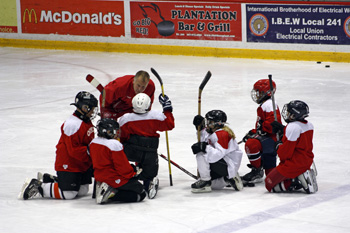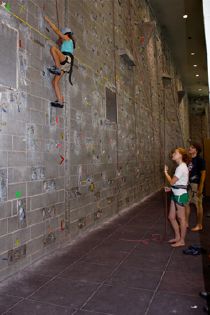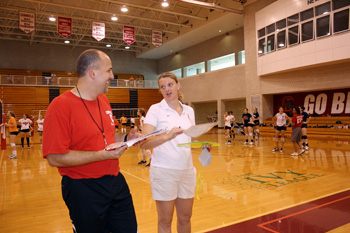No lazy days for Cornell Athletics when summer sports camps are in session

Kids at Cornell Summer Sports School with hockey camp coach Dan Elberty (who during the year is an assistant football coach at Ithaca College).
When most people think of college athletics, they assume that summer is a quiet time. They picture empty playing fields and courts fallen silent. Many think that an athletic department might shut down altogether, giving coaches and administrators a few months to recuperate from the grind of the school year.
Anyone who drives up Campus Road during the month of July, however, knows full-well how wrong those assumptions are.
July means one thing in Cornell's Department of Athletics and Physical Education -- Summer Sports School.
Like nearly every other Division I school, Cornell runs sports camps that give children and teens the opportunity to come to campus and learn from Big Red coaches and student-athletes. Unlike many other schools, however, Cornell's camp program encompasses its entire department, which includes its outdoor education program.

Cornell Summer Sports School includes rock climbing and sailing along with traditional camp sports like volleyball and basketball.
All together, Cornell offers 41 camps in 24 different activities, ranging from basketball and volleyball to less-common camp sports like rock climbing and sailing. For the past 30 years, the department has also offered a month's worth of Youth Sports Day Camps for children ages 7-12. At YSDC, kids are placed in groups by age and receive individual and group instruction in a variety of sports, learning and playing several different sports each week.
This year, Cornell has experienced a record number of camp-goers: more than 4,200 kids from 42 states and 20 foreign countries. The increased enrollment is partially due to a renewed push to market the Summer Sports School in the past two years, but it also is a direct result of the success of Cornell's sports teams, which has led to an increase of local, regional and national television exposure.
"Over the last few years, we have definitely seen an increase in campers coming to us from parts of the country that we haven't had campers from before, and that has everything to do with Cornell's national prominence," says Kath Fenzel '02, sports school director. "The television exposure has been great in letting people know about Cornell Athletics, and after the campers see our student-athletes and coaches on television, they want to come to Ithaca and learn from them in summer camp. In return, it benefits our programs because our coaches end up seeing potential recruits that they might not have seen otherwise."
Sarah Bernson, the Wendy Schaenen '79 Head Coach of Volleyball, has seen this firsthand.
"We run two camps -- a high-potential, advanced camp and an all-skills camp," Bernson says. "The high-potential camp consists of high school age campers, and we run three sessions a day. It's high intensity, and we try and run it like a college practice. A lot of our recruits come and participate so they get an idea of what playing at Cornell is like. [We] coaches get some hands-on experience with them and see their personalities and work ethic. For the past four years, we've taken at least two campers into [each] incoming [Cornell] class."

Cornell Summer Sports School volleyball coaches Chris Duenow and Sarah Bernson chat during camp activities.
Not all the coaches focus on high schoolers, and many prefer to keep their camps geared toward children in the local community.
"Our campers range in age from 7 to 15," says Dayna Smith, the Rebecca Quinn Morgan '60 Head Coach of Women's Basketball. "It's really rewarding because you see a lot of the younger girls getting coached for the first time ever, and it's amazing how quickly some of them learn. It's also important to the local community. Because ours is a day camp, most of our campers are local. They come to the camp and they make a connection to our program and to our players, many of whom serve as counselors, and then they come out during the season to support our team."